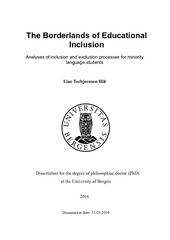| dc.description.abstract | This dissertation is based on three studies that provide qualitative analyses of systemic inclusion and exclusion processes for the group labelled minority language students in Norwegian educational policy. The theoretical framework is systems-theory, as understood by Niklas Luhmann. Overall, the dissertation focuses on the systemic conditions for inclusion, especially the excluding side effects of expectations, requirements and categorisations that at the outset are regarded as inclusive. The dissertation contributes to the research field of inclusive education both empirically, by providing knowledge about the multiple barriers minority language students encounter in the educational system, and theoretically, by showing how Luhmann’s systemstheory can prove useful in studies of educational inclusion and exclusion. The principles of education for all and inclusive education have since the nineties been pronounced global educational policy objectives. In Norway, these conceptions can be traced even further back in time, as a unitary and inclusive school system was closely related to the development of the welfare state during the twentieth century. An inclusive school has been considered essential for achieving national identity, social equality, solidarity and economic prosperity. Still, ever since the first era of public schooling, different groups have been excluded, despite notions of inclusion. While inclusion certainly has been achieved in terms of educational access for all, internal forms of exclusion may contribute to inequalities concerning educational opportunities within the educational system. During the last decade, the Norwegian government has been increasingly concerned with the development of skills and competencies that are considered necessary to compete globally. There has been a shift in educational priorities from ensuring national identity to knowledge economic considerations. Simultaneously, there has been increased political concern for the educational participation and performance of minority language students. In particular, the group of newly arrived minority language students has been considered at risk for marginalisation, and are presently offered so-called introductory classes in order to compensate for their educational disadvantages. Although many statistical studies have shown systematic differences between majority and minority language students, there have not been many qualitative studies on the systemic processes that entail inclusion and exclusion for minority language students, especially those who are newly arrived in Norway and attend introductory classes. The first study in this dissertation is based on an analysis of four policy documents from the Norwegian government, while the second and third studies are based on analyses of fieldwork material from two upper secondary schools with introductory classes for newly arrived minority language students. The first study put the spotlight on how the phenomena of inclusion and exclusion are understood in political documents, as well as how minority language pupils are addressed and categorised. The second study focuses on the requirements for participation set by school organisations with introductory classes, and how these requirements lead to internal differentiation and thus “including exclusions” for newly arrived students. The third study illuminates how global educational expectations associated with teacher and student roles unfold in the context of school organisations and position newly arrived minority language students in the space of exclusion. Based on the findings in these studies, it can be argued that the Norwegian school system rests on requirements and expectations that constitute a risk for especially newly arrived students’ educational careers. Although the project has been empirically driven, the contribution of the dissertation is also theoretical. The research field of inclusive education has been criticised for being under-theorised and characterised by difficulties of defining and operationalising the concepts of inclusion and exclusion. The three studies in this dissertation explore different procedures inspired by Luhmann’s systems-theory in order to analyse inclusions and exclusions from a multi-systemic perspective. Since Luhmann does not offer methodological advice, the analytical procedures should be regarded as a further development of systems-theory in order to make it suitable for analyses of inclusion and exclusion based on different kinds of empirical material. The thesis thus contributes to the field of inclusive education not only in terms of providing more information about the educational conditions of the group of minority language students, but also by showing how the research field can benefit from the concepts and systemic distinctions offered by systems-theory. Given the perspective of systems-theory, the starting point of the dissertation is processes of inclusion and exclusion generated by educational priorities. The dissertation thus illuminates the exclusionary consequences of the present educational semantics of the knowledge economy with its emphasis on skills policies. Since the findings suggest that the categorisation of minority language students is based on deviance, it will be argued that this asymmetrical categorisation obstructs the complex empirical reality of the individuals at issue. It can be argued that homogenous educational structures lead to more educational exclusions in the encounter with a heterogeneous student population. The dissertation thus suggests that the educational system should increase its self-reflective ability and conceptual complexity concerning its “environment of individuals”. Moreover, it encourages a reflection on the systemic conditioning of inclusion and exclusion in the present educational horizon of the knowledge economy, instead of attributing educational failure to the characteristics of individual students. | en_US |
